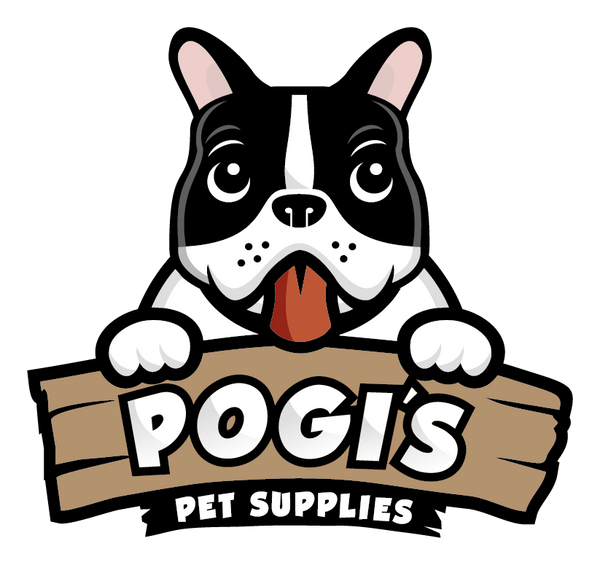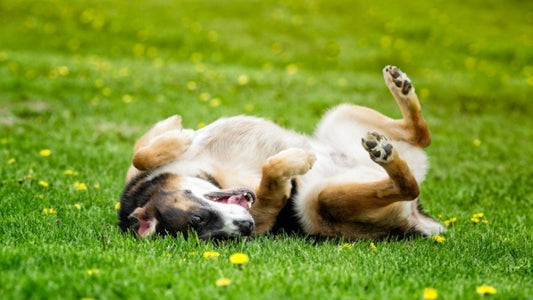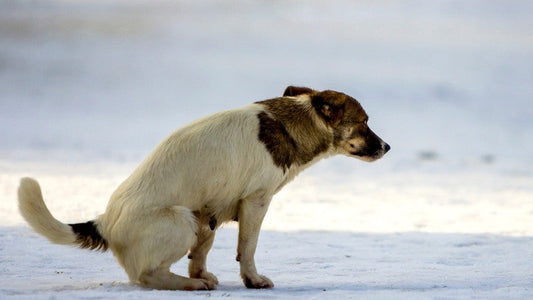You just finished bathing your beloved pet, their fur soft and clean, only to watch them sprint toward the yard and drop straight into a pile of poop. A few moments test a dog owner’s patience like that one. It’s gross, confusing, and weirdly common. Many pet parents admit their dogs have rolled in poop at least once, leaving everyone wondering what’s going on inside that curious canine nose.
For dogs, rolling in poop isn’t just random mischief. It’s part curiosity, part instinct, and sometimes a way to replace that fresh dog shampoo smell with something they find more familiar. What seems unpleasant to us may feel exciting or meaningful to them, a sort of communication or self-expression in their unique dog behavior.
So why does your dog roll in poop, and how can you keep your clean pup from turning into a smelly one again? Let’s sniff out the answers.
Why Dogs Roll in Poop: The Science Behind the Stink?

Ancestral Instinct for Scent Camouflage
What seems like pure mischief often traces back to survival instincts. When dogs roll in poop, they are repeating a behavior deeply rooted in their past.
Long before walks on a leash and comfy beds, wild dogs relied on their sense of smell to stay hidden and survive. Rolling in strong scents helped them blend into their surroundings, making it harder for potential predators or prey animals to detect them.
Even though your pup no longer depends on hunting or hiding, those instincts still influence how they react to different smells. The scent of poop or other smelly things might awaken that old urge to blend in or share information with other members of their pack.
It may seem unpleasant to humans, but for dogs, this rolling behavior feels natural and serves as a small reminder of their ancient connection to the animal world.
Social Communication Through Scent
Dogs rely more on their nose than on any other sense. While humans speak with words, dogs communicate through scent. When your dog rolls in poop, it may be their way of collecting a scent worth sharing. This behavior, often called scent rolling, can act like a message to other dogs, saying, “Look what I found.”
Some dogs roll to mix the poop with their own scent, especially in familiar areas where they want to leave a stronger mark. Others may carry the scent back to their dog family out of instinct. According to animal behavior research highlighted by the BBC, animals often use strong smells to communicate within their groups, signaling potential food, danger, or environmental changes.
So, that unpleasant smell clinging to your pup might not be a misstep. It could be their way of staying social in a language built entirely on scent.
Sensory Enjoyment and Stimulation
You might be gagging at the smell, but your dog? They’re strutting around like they just discovered the world’s finest cologne. As strange as it sounds, some dogs roll in poop simply because they enjoy the scent. While humans lean toward clean and floral, dogs love strong smells that make no sense to us.
That pile of poop? To your pup, it might be the sensory equivalent of a high-end perfume.
This isn’t just a quirky preference. Dogs have more than 220 million olfactory receptors, compared to our five million. Their brains are wired to pick up layers and complexity in odors, not just the strength. According to research shared by NOVA on PBS, a dog’s sense of smell is so advanced that they can detect scent patterns the human brain could never register.
So while you’re scrambling for cleaning wipes or dog shampoo, your pup may just be celebrating their new signature scent. To them, rolling in poop is a sensory adventure. To us, it’s a reminder that dogs experience the world in ways we’ll never truly grasp.
Behavioral and Environmental Factors
Ever notice how your dog rolls in poop right after a quiet day with little activity? Sometimes, the reason is less about instinct and more about entertainment. When dogs don’t get enough physical exercise or mental stimulation, they may turn to stinky stuff as a way to break the boredom. Rolling in poop can become their version of a thrill ride when toys, walks, or enrichment are lacking.
Dogs are also quick learners. If your pup rolls and you immediately react with loud protests or dramatic scrubbing sessions, that attention, good or bad, might reinforce the behavior. Some dogs even repeat it because they know it gets a strong response from their humans. Rescue dogs may be even more prone to scent rolling, especially if they spent time outdoors relying on their senses for survival.
Keeping your dog mentally engaged and physically active goes a long way. Puzzle toys, scent games, regular walks, and calm corrections help shift their focus away from smelly things and toward more positive forms of play and exploration.
How to Stop Your Dog from Rolling in Poop?
1. Clean Up Immediately (The Simplest and Most Effective Prevention)

If your dog never finds the poop, they won’t get a chance to roll in it. The most straightforward way to stop this behavior is to remove the source before your dog even notices it. Picking up their poop right after they go, whether in the yard, on a walk, or at the park, takes away the opportunity for scent rolling altogether.
Quick cleanup is easier when you’re prepared. That’s where Pogi’s Plant-Based Compostable Poop Bags come in. These bags are thick, tear-resistant, and designed to block odors, even in muddy or grassy areas. Plus, they’re made from sustainable materials that help you care for the environment while caring for your dog.
Clipping a small bag dispenser to your leash keeps you ready for every walk. And bringing a few extras never hurts. Dogs love to sniff out old spots or explore new trails where other animals may have left their mark.
When the poop disappears quickly, your dog has nothing to roll in. Over time, this removes the reward and helps the habit fade, especially when combined with positive reinforcement and structured activity.
2. Distract and Redirect Early (Training Through Awareness)
That moment when your dog lowers their head and starts sniffing with extra focus is your sign to step in. Rolling in poop is often preceded by a few clear signals like slow pacing, head tilts, or a tail that’s wagging with intent. The earlier you notice these cues, the easier it becomes to prevent the behavior.
Give a calm and clear cue such as “Leave it,” “No roll,” or “Come.” Avoid raising your voice. Loud reactions can create excitement, which often leads to disobedience rather than cooperation. The key is timing. As soon as your dog responds, reward them with a treat, praise, or a quick play session. This helps them associate listening with something positive.
Begin by practicing commands like “Leave it” indoors using safe objects like toys or treats on the floor. Once your dog understands the command, apply it in outdoor settings where distractions like other animals, strong scents, and fellow dogs are present.
If your dog ignores the cue, try redirecting their attention. Offer a favorite toy, encourage them to keep walking, or guide them toward a more acceptable sniffing spot. Dogs learn faster when you replace the unwanted behavior with a better option.
3. Keep Them Engaged and Mentally Stimulated (Prevent Boredom Behavior)
A bored dog is a creative dog, and sometimes that creativity leads straight into a pile of poop. Rolling in smelly things can be a sign that your dog is looking for excitement or stimulation they’re not getting elsewhere. Mental and physical enrichment helps fill that gap and gives your dog more satisfying ways to explore their environment.
Daily activities that tap into their natural instincts can go a long way. Rotate toys every few days to keep things interesting. Puzzle feeders, chew toys, and treat-dispensing balls keep their minds busy and offer rewards that don’t involve rolling in foul-smelling substances.
Scent games are especially effective. Hide a few treats in the grass or use a snuffle mat to satisfy your dog’s urge to sniff and forage. These games give purpose to their powerful sense of smell and redirect attention away from poo or other animals’ waste.
If your dog spends most of the day inside, longer or more frequent walks can help. Dogs that are tired from walking or playtime are less likely to engage in unwanted behaviors. This is especially true for active breeds like Terriers, Border Collies, or Labs, who thrive with at least 45 to 60 minutes of movement each day.
4. Use Barriers and Supervision (Manage the Environment)
Sometimes the best way to prevent your dog from rolling in poop is to make sure they never get the chance. Managing the environment with a little planning can go a long way in stopping this habit before it starts.
Start with your own yard. Designate a specific potty zone and clean it up right after each use. When dogs learn that certain areas are for bathroom breaks and others are for play, they’re less likely to wander off in search of smelly things. Consistent cleanup also removes temptation before your pup has time to explore.
On walks or hikes, keep your dog on a leash when approaching areas known for wildlife or other dogs. Some spots tend to attract animal droppings, and even a few seconds of unsupervised sniffing can lead to an unexpected roll. In homes with multiple dogs, creating separate fenced potty zones or using clear boundaries helps reduce exposure to shared messes.
During off-leash time, stay engaged. Dogs often take advantage of those split seconds when you turn your back. Using long training leads between 15 and 30 feet can offer freedom while still giving you control, especially during outdoor training sessions.
5. Bathe and Wipe Properly After Incidents (Quick Hygiene is Critical)

Once your dog has rolled in poop, time is not on your side. The longer that mess stays on their coat, the greater the risk of skin irritation, lingering odor, or even infection. Immediate cleanup is essential, especially if your dog rolls in strong-smelling substances left behind by other animals.
For quick cleanups after walks or park visits, Pogi’s Plant-Based Grooming Wipes are a must-have. Made from soft bamboo fiber and infused with soothing ingredients like aloe vera and vitamin E, these wipes gently remove bacteria and odor without drying out your dog’s skin. They’re perfect for wiping down key zones like the neck, shoulders, and side of the body, where most dogs tend to roll.
If the mess is more than wipes can handle, use a mild dog shampoo that’s free from added fragrance. Human shampoos should be avoided since they can upset your dog’s natural pH balance. Rinse with lukewarm water and make sure to dry your dog thoroughly. Damp fur can trap more dirt and lead to itching.
Keep a travel pack of wipes in your walking bag or car. Having them handy ensures you're always ready for those not-so-fresh surprises.
6. Consider Training and Behavior Modification (For Persistent Rollers)
If your dog seems determined to find every smelly thing within a five-mile radius, it may be time to shift focus toward deeper behavior work. Training and behavior modification can make a lasting difference, especially for dogs who roll in poop repeatedly despite distractions and cleanup routines.
Start with consistent reinforcement. Every time your dog walks away from poop or responds to a cue like “Leave it,” offer praise or a treat. Over time, this teaches them that ignoring poop leads to something better. On the flip side, avoid scolding or dragging them into a bath out of frustration.
Studies show that punishment-based training can increase anxiety, fear, and even aggression. Dogs trained with positive methods tend to be more responsive and have fewer behavioral problems, as explained in the MSD Veterinary Manual.
For some dogs, a desensitization approach works well. Gradually exposing them to safe but smelly items and rewarding calm behavior can help them resist the urge to roll. This type of training replaces overreaction with tolerance.
If rolling becomes a compulsive habit or starts to impact your daily life, working with a certified dog behaviorist is a smart move. A professional can create a custom plan using techniques like counter-conditioning and scent-focused enrichment.
It’s also worth reviewing your dog’s diet and general health. Sometimes, unusual behavior can stem from nutritional gaps or discomfort that leads to obsessive habits.
When to Consult a Veterinarian?

Most of the time, dogs rolling in poop is more about curiosity or instinct than anything serious. But when it becomes frequent or obsessive, it might signal something more than just quirky behavior.
Here are a few signs that it’s time to talk to your vet:
• Your dog rolls in poop often and with high intensity
• They also eat feces or show repeated licking behavior
• You notice changes in appetite, digestion, or energy levels
• They seem anxious or overly focused on strong scents
These behaviors can sometimes be linked to nutrient deficiencies, digestive issues, or compulsive tendencies.
A veterinarian can check for underlying health concerns and recommend adjustments to your dog’s diet, routine, or environment. Addressing the root cause early helps prevent the behavior from becoming more serious over time.
Why Cleanliness Matters — and How Pogi’s Helps
A single roll in poop is more than just a smelly inconvenience. It can carry bacteria, parasites, and other harmful pathogens that affect not just your dog but everyone in your home. Cleanliness plays a bigger role in your dog’s health than most pet parents realize. The faster you respond, the safer your dog’s coat stays, and the less chance there is of spreading germs to furniture, hands, or paws.
That’s where smart, reliable cleanup tools make all the difference. Pogi’s Grooming Wipes are designed for quick, safe, and effective cleanups after those muddy or messy encounters. Made from bamboo fiber and packed with gentle ingredients, they help you handle unexpected messes wherever you are.
And when it comes to prevention, Pogi’s Compostable Poop Bags offer a fast and hygienic way to remove waste before your dog even gets the chance to roll in it. Durable, odor-blocking, and earth-friendly, they help reduce temptation while staying kind to the planet.
Keep Your Dog Clean, Happy, and Poop-Free
Rolling in poop might feel like a prank, but for your dog, it’s just another way to explore the world. While you can’t change their instincts, you can guide their behavior with the right mix of patience, training, and quick cleanups. A little awareness goes a long way in turning those messy moments into rare exceptions.
Proactive cleanup, positive reinforcement, and everyday essentials make all the difference. Your dog stays fresh, your home stays clean, and cuddle time doesn’t come with a side of stinky surprises.
Ready to outsmart the mess before it starts? Keep your walks clean and your pup spotless with Pogi’s Compostable Poop Bags and Plant-Based Grooming Wipes.
Fresh dog. Happy walks. No poop drama.
FAQs
Do dogs grow out of rolling in poop?
Some dogs may roll in poop less frequently as they age, especially when provided with proper training, enrichment, and consistent supervision. However, many dogs continue this behavior into adulthood because it’s deeply rooted in their natural instincts. Dogs roll in poop for a mix of reasons, including boredom, scent marking, or even sensory stimulation. If your pup still finds stinky stuff irresistible during walks, reinforcing commands like “leave it” and keeping them engaged with toys or scent games can help reduce the habit over time.
Why does my dog roll in its own poop?
While it’s more common for dogs to roll in the poop of other animals, some may roll in their own feces out of curiosity, stress, or lack of stimulation. This can also be a form of scent rolling, where the dog mixes its own smell with familiar surroundings. If your dog rolls in its own poop often, it might be trying to communicate or seeking sensory input. Cleaning up immediately, adding more outdoor activity, and using tools like Pogi’s compostable poop bags can help manage the behavior.
Is rolling in poop normal dog behavior?
Yes, rolling in poop is considered normal dog behavior, though it may not be pleasant for pet parents. It’s a form of scent-driven communication or exploration that dates back to their wild ancestors. Dogs love strong scents, and rolling in poop or other smelly things is one way they connect with their environment and sometimes other animals. While the behavior can be managed, it’s not unusual. Keeping your dog engaged, supervising off-leash time, and responding with consistent cues are all effective ways to minimize the rolling behavior.





